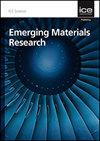The structural and optical properties of PVA/CMC copolymer cured by UV-irradiation at different times
IF 1.2
4区 材料科学
Q4 MATERIALS SCIENCE, MULTIDISCIPLINARY
引用次数: 0
Abstract
Polyvinyl alcohol (PVA)/Carboxymethyl cellulose (CMC) blend films with equal amounts (0.25 g) of both polymers were prepared via a simple and low-cost comparative casting method. Then, the PVA/CMC blend films were exposed to UV-irradiation for varied time intervals (1, 12, 26, 32, 40, and 48 h). The UV-irradiations effect on the physical properties of as-prepared films including the structure, morphology, composite and optical properties (transmittance, absorbance, and band-gap (Eg)) was examined. FESEM images display that UV-irradiation has a strong effect on the shape of PVA/CMC blend films. The XRD patterns show various crystalline qualities in the microstructure of as-synthesis samples. The FTIR spectra demonstrate that UV-irradiation time and CMC film had a positive impact on the blend polymer structure since covalent connections were formed between CMC and PVA. Furthermore, the analysis results of optical inspections show the absorbance of the PVA/CMC films was improved with an increment of irradiation times from (1 to 40 h). An important tunning of Eg values of blend films was realized. It shows a slightly increased from (4.64 eV to 4.84 eV) with increasing irradiation time from (1 to 40 h). The Eg value (3.21 eV), however, displayed an inverted behaviour due to an increased irradiation time of 48 h, this reduction can be ascribed to the creation of defects inside the blend band gap. Finally, the physical properties modification of PVA/CMC blend films using UV-Irradiation makes it an amazing contender in the optoelectronic area.不同时间紫外线照射固化的 PVA/CMC 共聚物的结构和光学特性
采用简单、低成本的对比浇铸法,制备了两种聚合物用量相等(0.25 g)的聚乙烯醇/羧甲基纤维素(CMC)共混膜。然后,将PVA/CMC共混膜暴露于不同时间间隔(1、12、26、32、40和48 h)的紫外线照射下。考察了紫外辐射对制备膜的物理性能,包括结构、形貌、复合性能和光学性能(透光率、吸光度和带隙)的影响。FESEM图像显示,紫外光照射对PVA/CMC共混膜的形状有很强的影响。XRD图谱显示合成样品的微观结构具有不同的结晶性质。红外光谱分析表明,紫外光照射时间和CMC膜对共混聚合物的结构有积极的影响,因为CMC与PVA之间形成了共价连接。光学检测分析结果表明,PVA/CMC膜的吸光度随辐照时间的增加而增加(1 ~ 40 h)。实现了共混膜Eg值的重要调整。随着辐照时间的增加(1 ~ 40 h),辐射强度从(4.64 eV)略微增加到(4.84 eV)。然而,由于48小时的辐照时间增加,Eg值(3.21 eV)表现出相反的行为,这种减少可以归因于在混合带隙内产生缺陷。最后,利用紫外辐照对PVA/CMC共混膜进行物理性能改性,使其成为光电领域的有力竞争者。
本文章由计算机程序翻译,如有差异,请以英文原文为准。
求助全文
约1分钟内获得全文
求助全文
来源期刊

Emerging Materials Research
MATERIALS SCIENCE, MULTIDISCIPLINARY-
CiteScore
4.50
自引率
9.10%
发文量
62
期刊介绍:
Materials Research is constantly evolving and correlations between process, structure, properties and performance which are application specific require expert understanding at the macro-, micro- and nano-scale. The ability to intelligently manipulate material properties and tailor them for desired applications is of constant interest and challenge within universities, national labs and industry.
 求助内容:
求助内容: 应助结果提醒方式:
应助结果提醒方式:


